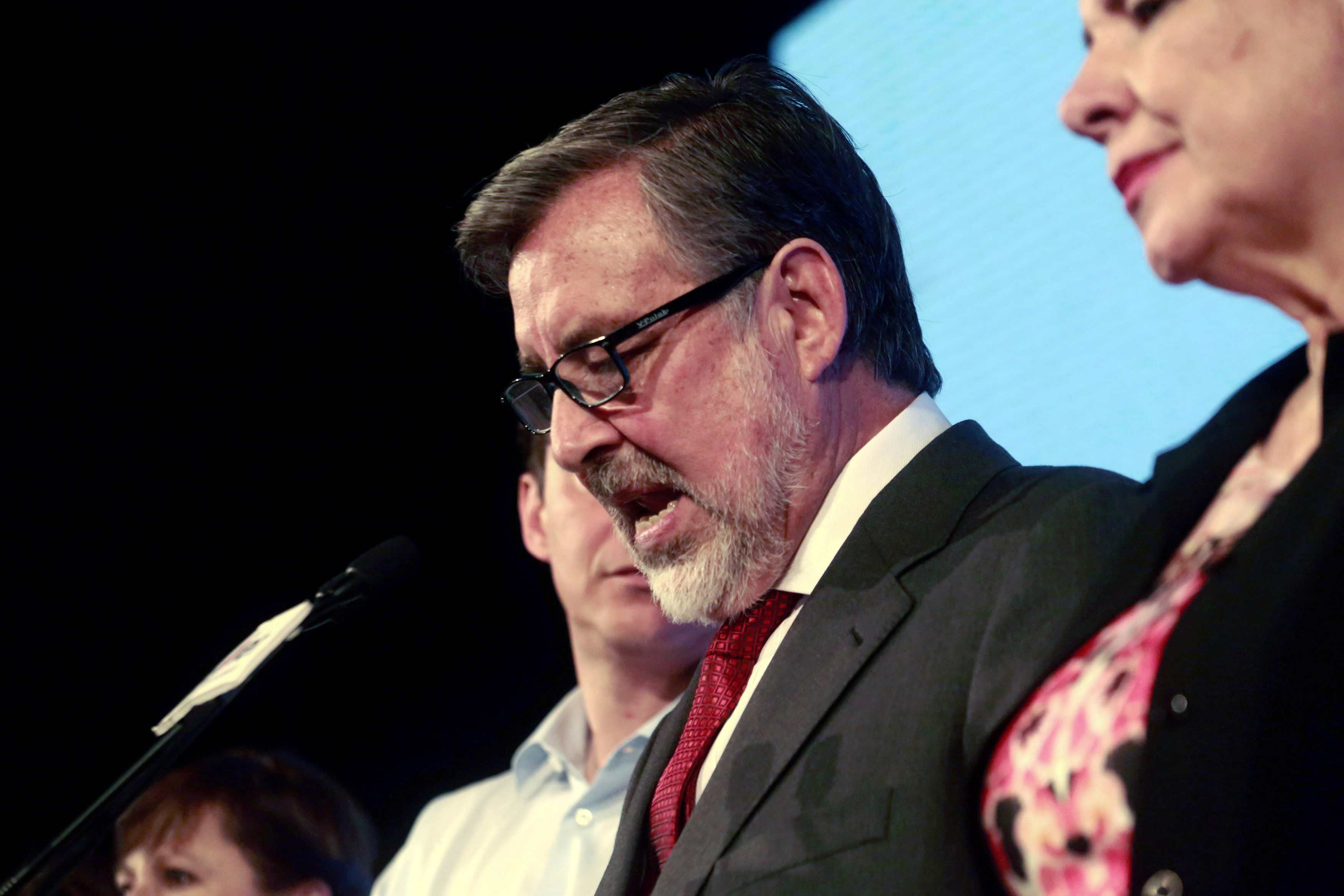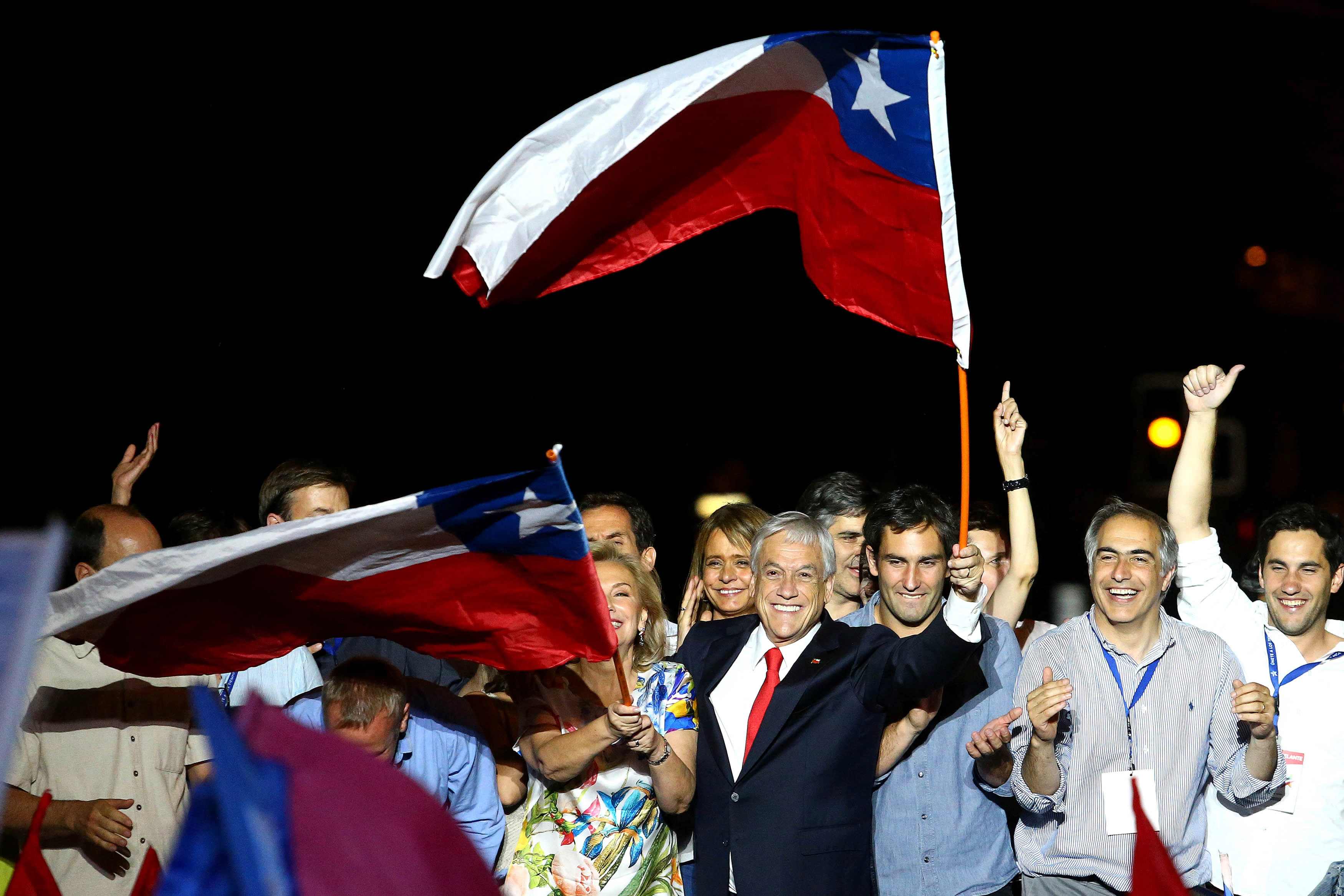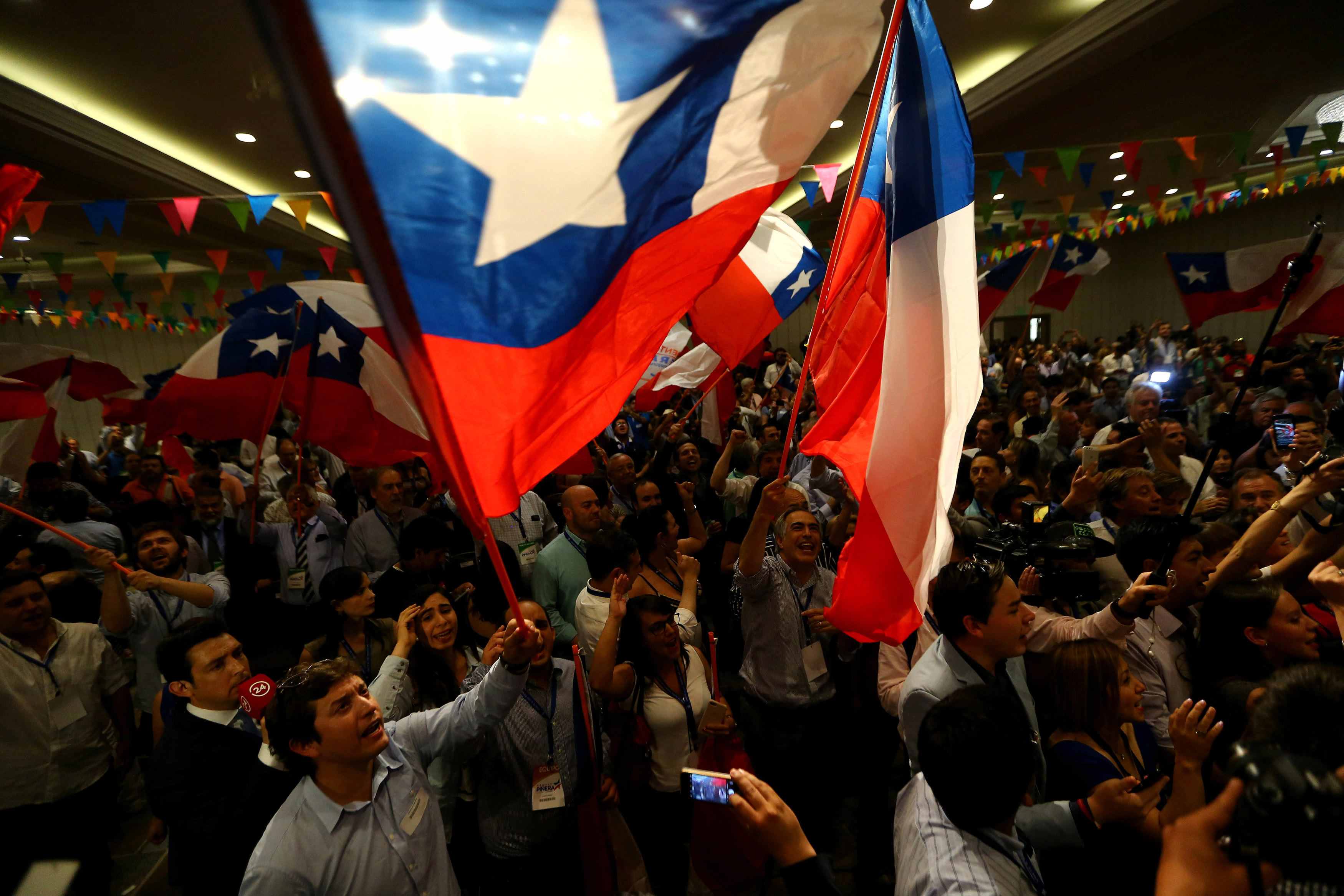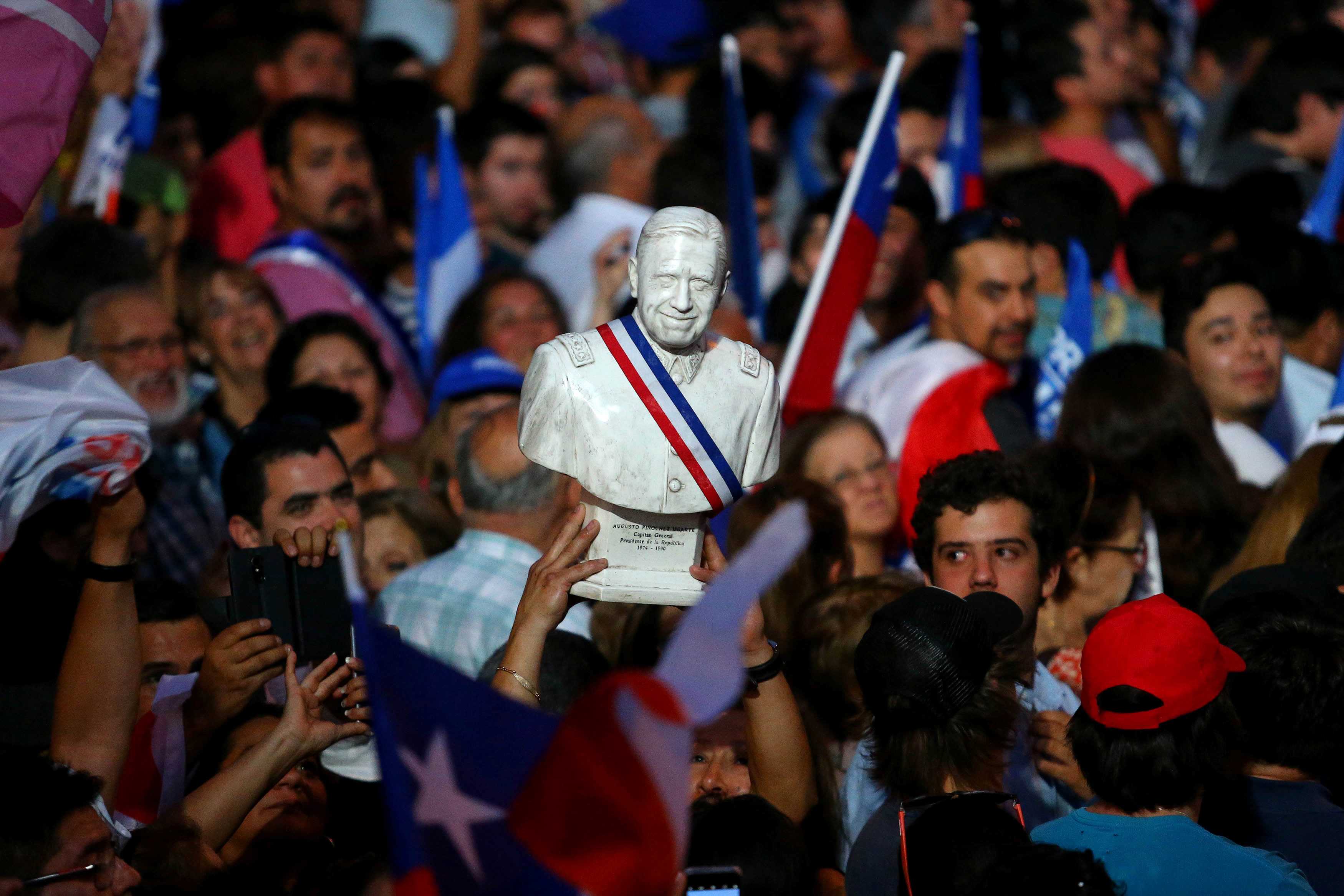Right-wing candidate and former president, Sebastian Pinera, was elected as president of Chile for the second time on Sunday.
Electoral authorities said the 68-year-old conservative, who previously led the South American nation from 2010-2014, had 55 percent of the vote with 98 percent of ballots counted.
His leftist rival Alejandro Guillier, a 64-year-old TV presenter turned senator who ran as an independent backed by outgoing center-left President Michelle Bachelet, recognized his own "tough defeat" after receiving 45 percent.

Presidential candidate Alejandro Guillier gives a speech to concede defeat after Chile's presidential election, in Santiago, Chile, December 17, 2017. /Reuters Photo
Presidential candidate Alejandro Guillier gives a speech to concede defeat after Chile's presidential election, in Santiago, Chile, December 17, 2017. /Reuters Photo
"On this day, we can all feel proud, for our democracy, our republic and our electoral system," Guillier said. "I also want, tonight, to congratulate my contender, Sebastian Pinera, the new president of the republic. I have already called him to congratulate him on his impeccable and solid triumph."
The election day was relatively calm, despite a slight scuffle between Pinera's supporters and opponents when he went to vote, and some voters trying to throw eggs at Guillier in the morning.
Even though a high level of abstention being feared, long lines were seen at major polling stations in Santiago, including at the national stadium, where voters had to wait over 45 minutes to cast their ballot.
Chile politics: Between center-left and center-right
Pinera will lead the South American nation – the world's top copper producer – for four years starting in March.
He will once again take over from Bachelet, who was barred by the constitution from running for re-election.
Bachelet and Pinera have tag-teamed the presidency since Bachelet first took office in 2006. Since then, they have alternated in power, switching Chile's politics between center-left and center-right each time.

Presidential candidate Sebastian Pinera and his wife Cecilia wave flags after winning Chile's presidential election, in Santiago, December 17, 2017. /Reuters Photo
Presidential candidate Sebastian Pinera and his wife Cecilia wave flags after winning Chile's presidential election, in Santiago, December 17, 2017. /Reuters Photo
Pinera called for unity after his victory.
"Chile needs agreements more than confrontations," he said. "The paths of the future unite us. Sometimes the stories of the past separate us."
Reaching out to his opponent, he added: "I want to talk to him about the points we agree about."
Uncertain race
The outcome of the runoff had been far from certain after Pinera scored a much lower than expected 37 percent in the first round of the election held November 19.
Analysts had speculated that Guillier could bolster his 22 percent from that round by getting votes from other leftist candidates who were defeated.
But in the end, most voters appeared to come down in favor of the experience of Pinera, who is worth some 2.7 billion US dollars and painted himself as a safe pair of hands for Latin America's fifth-biggest economy.

Supporters of Chilean presidential candidate Sebastian Pinera react after hearing the results of the second round vote, in Santiago, December 17, 2017. /Reuters Photo
Supporters of Chilean presidential candidate Sebastian Pinera react after hearing the results of the second round vote, in Santiago, December 17, 2017. /Reuters Photo
With no recent reliable voter surveys in the weeks before Sunday's runoff, however, the outcome had been seen as wide open.
Marco Moreno, of Central University, had called it "the most uncertain election since the return of democracy" after the end of Augusto Pinochet's dictatorship in 1990.
To revitalize Chile's economy?
Pinera had the support of the business community, promising to lower taxes to get the economy growing again.
"I voted for him for the economy," said Jose Oyaneder, a 54-year-old salesman at campaign headquarters. “When he was president my [business] was quite good and I hope this time it’s the same.”
Although copper exports, which contribute greatly to Chile's wealth, are increasing thanks to demand from China and from the burgeoning manufacture of electric cars, the country is struggling compared to previous years.
Its GDP is forecast to expand by a modest 1.4 percent this year, the slowest pace in eight years. Forecasts suggest it will grow 2.8 percent next year.
The son of a prominent centrist politician, Pinera is a Harvard-trained economist who made his fortune introducing credit cards to Chile in the 1980s.
As of 2017, he was ranked #745 on Forbes’ global rich list, with a 2.7 billion US dollars fortune.

Supporters of presidential candidate Sebastian Pinera hold a bust of former dictator Augusto Pinochet after Pinera won the presidential election, in Santiago, Chile, December 17, 2017. /Reuters Photo
Supporters of presidential candidate Sebastian Pinera hold a bust of former dictator Augusto Pinochet after Pinera won the presidential election, in Santiago, Chile, December 17, 2017. /Reuters Photo
Over months of aggressive campaigning, the former president brandished his business success and first term in office as proof of competence, contrasting himself with Guillier’s relative lack of political and executive experience.
Pinera’s first administration was marked by a vibrant economy lifted by booming copper prices, but is perhaps best remembered for the spectacular rescue in 2010 of 33 miners who were trapped underneath the Atacama desert.
Pinera has promised to make Chile the first country in Latin America to achieve “developed nation” status in the Organization for Economic Cooperation and Development, a Paris-based club of wealthy nations.
"Some things have to be fixed – health, pensions, a lot of discrimination in Chile," said Laura Garcia, 64, who works in a cleaning company. "I have faith in Pinera."
Source(s): AFP
,Reuters
,Xinhua News Agency






